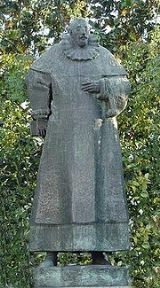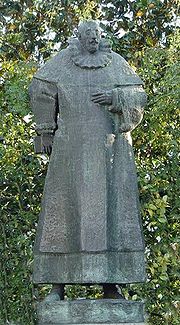
Francisco Sanches
Encyclopedia

Portuguese people
The Portuguese are a nation and ethnic group native to the country of Portugal, in the west of the Iberian peninsula of south-west Europe. Their language is Portuguese, and Roman Catholicism is the predominant religion....
philosopher and physician
Physician
A physician is a health care provider who practices the profession of medicine, which is concerned with promoting, maintaining or restoring human health through the study, diagnosis, and treatment of disease, injury and other physical and mental impairments...
of Sephardi Jewish
Sephardi Jews
Sephardi Jews is a general term referring to the descendants of the Jews who lived in the Iberian Peninsula before their expulsion in the Spanish Inquisition. It can also refer to those who use a Sephardic style of liturgy or would otherwise define themselves in terms of the Jewish customs and...
origin.
Early life and academic career
He was born in TuiTui
As a noun, Tui may refer to:* Tu'i , a title of nobility in Polynesia and some of Melanesia* Tui Awards, New Zealand's annual music industry awards* Tui , a brand of New Zealand beer produced by Tui Breweries...
, and baptized in Braga, Portugal, into the Catholic faith
Catholicism
Catholicism is a broad term for the body of the Catholic faith, its theologies and doctrines, its liturgical, ethical, spiritual, and behavioral characteristics, as well as a religious people as a whole....
in 1550 or 1551, to António Sanches, also a physician, and Filipa de Sousa. Being of Jewish origin, even if converted, he was legally considered a New Christian
New Christian
New Christian was a term used to refer to Iberian Jews and Muslims who converted to Roman Catholicism, and their known baptized descendants. The term was introduced by the Old Christians of Iberia who wanted to distinguish themselves from the conversos...
.
He studied in Braga until he was 12 years old, time when he moved to Bordeaux
Bordeaux
Bordeaux is a port city on the Garonne River in the Gironde department in southwestern France.The Bordeaux-Arcachon-Libourne metropolitan area, has a population of 1,010,000 and constitutes the sixth-largest urban area in France. It is the capital of the Aquitaine region, as well as the prefecture...
(France
France
The French Republic , The French Republic , The French Republic , (commonly known as France , is a unitary semi-presidential republic in Western Europe with several overseas territories and islands located on other continents and in the Indian, Pacific, and Atlantic oceans. Metropolitan France...
) with his parents, escaping the surveillance of the Portuguese Inquisition
Portuguese Inquisition
The Portuguese Inquisition was formally established in Portugal in 1536 at the request of the King of Portugal, João III. Manuel I had asked for the installation of the Inquisition in 1515 to fulfill the commitment of marriage with Maria of Aragon, but it was only after his death that the Pope...
, where he continued his studies at the College de Guyenne. He went on to study medicine
Medicine
Medicine is the science and art of healing. It encompasses a variety of health care practices evolved to maintain and restore health by the prevention and treatment of illness....
in Rome
Rome
Rome is the capital of Italy and the country's largest and most populated city and comune, with over 2.7 million residents in . The city is located in the central-western portion of the Italian Peninsula, on the Tiber River within the Lazio region of Italy.Rome's history spans two and a half...
(Italy
Italy
Italy , officially the Italian Republic languages]] under the European Charter for Regional or Minority Languages. In each of these, Italy's official name is as follows:;;;;;;;;), is a unitary parliamentary republic in South-Central Europe. To the north it borders France, Switzerland, Austria and...
) in 1569, and, back in France, in Montpellier
Montpellier
-Neighbourhoods:Since 2001, Montpellier has been divided into seven official neighbourhoods, themselves divided into sub-neighbourhoods. Each of them possesses a neighbourhood council....
and Toulouse
Toulouse
Toulouse is a city in the Haute-Garonne department in southwestern FranceIt lies on the banks of the River Garonne, 590 km away from Paris and half-way between the Atlantic Ocean and the Mediterranean Sea...
. He ended up, after 1575, as a professor
Professor
A professor is a scholarly teacher; the precise meaning of the term varies by country. Literally, professor derives from Latin as a "person who professes" being usually an expert in arts or sciences; a teacher of high rank...
of philosophy and medicine at the University of Toulouse
University of Toulouse
The Université de Toulouse is a consortium of French universities, grandes écoles and other institutions of higher education and research, named after one of the earliest universities established in Europe in 1229, and including the successor universities to that earlier university...
.
Main work and thought
In his Quod Nihil Scitur (That Nothing Is Known), written in 1576 and published in 1581, he used the classical skeptical arguments to show that scienceScience
Science is a systematic enterprise that builds and organizes knowledge in the form of testable explanations and predictions about the universe...
, in the Aristotelian
Aristotelianism
Aristotelianism is a tradition of philosophy that takes its defining inspiration from the work of Aristotle. The works of Aristotle were initially defended by the members of the Peripatetic school, and, later on, by the Neoplatonists, who produced many commentaries on Aristotle's writings...
sense of giving necessary reasons or causes for the behavior of nature, cannot be attained. He then argued that even his own notion of science - perfect knowledge
Knowledge
Knowledge is a familiarity with someone or something unknown, which can include information, facts, descriptions, or skills acquired through experience or education. It can refer to the theoretical or practical understanding of a subject...
of an individual thing - is beyond human capabilities because of the nature of objects and the nature of man. The interrelation of objects, their unlimited number, and their ever-changing character prevent their being known. The limitations and variability of man's senses restrict him to knowledge of appearances, never of real substances.
Sanches' first conclusion was the usual fideistic one of the time, that truth can be gained by faith. His second conclusion was to play an important role in later thought: just because nothing can be known in an ultimate sense, we should not abandon all attempts at knowledge but should try to gain what knowledge we can, namely, limited, imperfect knowledge of some of those things which we become acquainted with through observation, experience, and judgment. The realization that nihil scitur ("nothing is known") thus can yield some constructive results. This early formulation of "constructive" or "mitigated" skepticism was to be developed into an important explication of the new science by Marin Mersenne
Marin Mersenne
Marin Mersenne, Marin Mersennus or le Père Mersenne was a French theologian, philosopher, mathematician and music theorist, often referred to as the "father of acoustics"...
, Pierre Gassendi
Pierre Gassendi
Pierre Gassendi was a French philosopher, priest, scientist, astronomer, and mathematician. With a church position in south-east France, he also spent much time in Paris, where he was a leader of a group of free-thinking intellectuals. He was also an active observational scientist, publishing the...
, and the leaders of the Royal Society
Royal Society
The Royal Society of London for Improving Natural Knowledge, known simply as the Royal Society, is a learned society for science, and is possibly the oldest such society in existence. Founded in November 1660, it was granted a Royal Charter by King Charles II as the "Royal Society of London"...
.

Works
- Carmen de Cometa, 1577.
- Quod nihil scitur, 1581.
- De divinatione per somnum, ad Aristotelem, 1585.
- Opera Medica, 1636, which includes:
- De Longitudine et Brevitate vitae, liber
- In lib. Aristotelis Physiognomicon, Commentarius
- De Divinatione per Somnum
- Quod Nihil Scitur, liber
- Tractatus Philosophici, 1649.

